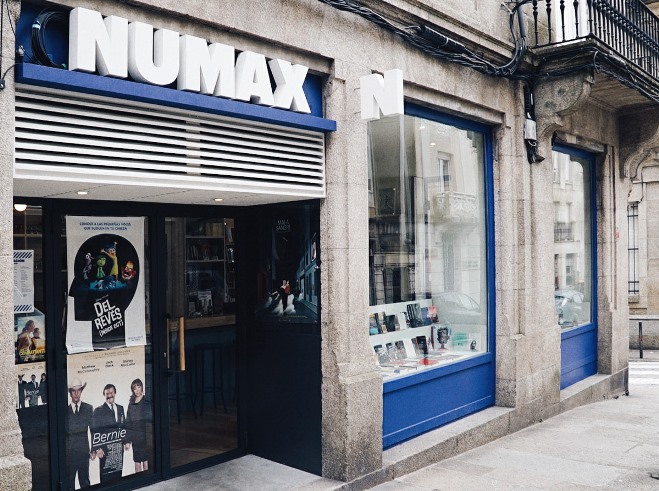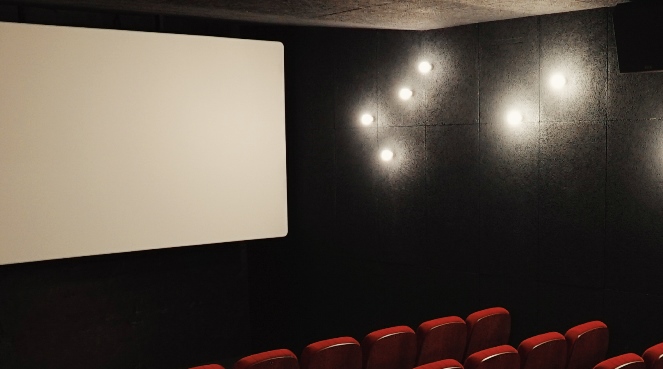Interview with Ramiro Ledo
NUMAX na casa, Spain
In a series of interviews with the exhibitors on its Validation Committee, Europa Cinemas takes stock of the situation facing independent exhibitors across Europe during this time of crisis. We begin by talking to Ramiro Ledo from the NUMAX cinema in Santiago de Compostela, Spain, who discusses the significant financial challenges and the initiatives that have been put in place within a very short time.

(Original version below)
1 – How are you?
Very well, thank you.
2 – How are you managing this unique situation from a professional perspective?
The overriding feelings are concern and uncertainty. From a commercial point of view, we have temporarily suspended the contracts of active personnel, on both permanent and temporary contracts, at the NUMAX and DUPLEX cinemas, the two venues that I manage. The government is covering 70% of their monthly salaries and we are supplementing this voluntarily up to a level of 100%. This is the only measure that the government has taken. At present, no measures have been put in place specifically for cinemas.
As for the relationship with cinemagoers who are members of our loyalty programmes through annual subscriptions, we have decided to extend these subscriptions free of charge by the duration of the cinema closure.
3 – What projects did you feel would be useful to maintain a certain level of activity and which ones have you implemented?
From the outset, once the administrative issues had been resolved and activities cancelled or postponed (which took us 2 weeks after cinemas closed their doors on 13 March), we tried to come up with a plan that would enable us to maintain contact with our audiences. I got in touch with some neighbouring exhibitors and we exchanged opinions, sharing information about initiatives that other cinemas were putting in place in countries that had already been affected by the coronavirus.
Talking to Manuel Asín (programmer at the Cine Estudio of the Círculo de Bellas Artes in Madrid), we were particularly inspired by the steps taken by certain cinemas, such as the Postmodernissimo (Perugia), the Kino Arsenal (Berlin) and the Film Forum (New York). Generally speaking, they had made the switch from cinema screenings to the online streaming of films. In some cases, the online offering focused on works linked to filmmakers and artists who had already featured on the bill at these cinemas, with certain films available free of charge for a limited period. The Film Forum concluded an agreement with a VoD platform to allow access to the films that had been screened during the week in which the cinema closed. A portion of the revenue went directly to the cinema – a symbolic contribution towards its reopening. As the days went by, similar initiatives became more widespread. In the United States, for example, the release of BACURAU was able to proceed thanks to the distributor Kino Lorber, which, through its Kino Now platform, managed to set up a system of virtual screening rooms linked to each cinema and in this way allocated the revenue from each virtual ticket sold.
It was therefore a question of finding a way of keeping a certain amount of our programming going, but also of maintaining a link with our audiences on a day to day basis. I got in touch with a video-on-demand platform and asked if it would be possible to give us access to their films, via rental and TVoD.
From a technical point of view, this proved more difficult than expected. Furthermore, VoD traffic was rising sharply at that particular moment and quickly developing a custom solution was problematic. Nevertheless, I managed to confirm that Vimeo on Demand was allowing this, so I contacted certain distributors to ask for their permission to include some of their films in our weekly programming. Every week we therefore update our programme with new and previously released films, while respecting the applicable legislation. The revenues are shared on a 50/50 basis with the distributors.
We have also signed up to the distributor A Contracorriente’s initiative https://salavirtualdecine.com and are incorporating some of its films into the weekly programming of NUMAX na casa and DUPLEX na casa (NUMAX and DUPLEX at home).
In this way we can continue to schedule releases via VoD as well as presenting heritage films, while also returning to recent films with more limited releases that we had already screened in the cinema, such as WAITING FOR THE BARBARIANS by Eugène Green. This is a way of maintaining our activity, while at the same time generating some highly symbolic revenue, albeit at a level that does not come close to covering our costs.
4 – Do you think these new activities could continue once the pandemic is over? Will new rules and new ways of doing things apply to your activity and that of your peers?
I don’t know. A few years ago, at the Locarno festival, I heard someone talking about an initiative that specifically aimed to provide cinemas with a tool that would allow them to operate a VoD service on their websites. I find that an interesting way of complementing the preview screenings programmed by cinemas, which sometimes have limited space and capacity (the NUMAX cinema, for example, is a single-screen, 70-seat cinema). Alongside preview screenings, this would allow cinemas, for example, to programme other films, which audiences would be able to access from home.
It seems very likely that once this pandemic is over exhibition plans will be adjusted. That should not necessarily be detrimental to the most active cinemas, as long as they benefit from the support of their government and specific measures aimed at developing their audiences and communication, as well as protection to ensure cinemas remain the most important place for disseminating films. During the lockdown period, many people are getting to know cinema through VoD. This is the positive aspect: bringing new films and new forms of accessing cinema to the attention of a public for whom the film theatre perhaps remained the sole point of reference. At the same time, it rekindles their memory of the film theatre, of what it has to offer in terms of comfort and technology... I think that the programming work of cinemas will become more challenging and that the public will appreciate spaces that offer more than just the simple screening of a film. In parallel, the majors will try to demonstrate their ability to turn a portion of the public away from cinemas and towards their own platforms.

5 – What are your main concerns for the coming months? In terms of your relationship with your audiences, do you have any fears or can you see reasons for optimism?
My main concern relates to the sanitary conditions. When we are able to reopen, will cinemas be a safe space for our audiences and our staff? I am also thinking about the duration of the closure and the conditions under which we will reopen, regardless of whether there are capacity restrictions. Since 13 March our takings have been zero and the estimated losses, made up of fixed costs, lost revenue and staffing costs, are substantial. We will need some time to make up the shortfall.
I prefer not to think too much about the conditions we will find ourselves in when we reopen, as summer is the least busy period for independent cinemas like ours. If we do not come up with a solution, more than one cinema will have to close its doors for good. It is difficult to say what my mood is at the moment, but I think the fact that we have kept the two venues going virtually will help us when the time comes to reopen them.
_______
April 2020
Belén Molla Diez, with Jean-Baptiste Selliez
Photo of Ramiro: Tamara de la Fuente
_______
_______
Entrevista a Ramiro Leda - Versión original
1 - Antes de nada, ¿cómo está?
Bien, gracias
2 - Desde un punto de vista profesional, ¿Cómo gestiona esta situación singular?
El sentir dominante es la preocupación y la incerteza. A nivel empresarial, hemos solicitado la suspensión temporal de los contratos del personal trabajador, tanto cooperativistas como asalariados en Cinema NUMAX y del personal asalariado en DUPLEX Cinema, los dos locales que gestiono. El gobierno asume en estos casos el 70% de la base reguladora de las remuneraciones mensuales y las empresas (NUMAX, S. Coop. Galega y Nocturama SL, respectivamente) complementan voluntariamente hasta el 100% del salario en ambos casos. Es la única medida a la que ahora mismo podemos acogernos de las implementadas por el estado. En España, a día de hoy, no existe ninguna medida específica para los cines.
En cuanto a la relación con las personas vinculadas a nuestros programas de fidelización mediante el carnet de abono anual (abono DUPLEX y abono NUMAX), decidimos prorrogar de forma gratuita todos los carnets tanto tiempo como permanezcan cerrados los cines.
3 - ¿Qué proyectos le parecieron interesantes para mantener su actividad y cuáles pudo llevar a cabo?
Desde el primer momento, una vez resueltas las cuestiones administrativas y cancelado o pospuestas las actividades ya comprometidas (lo que nos ocupó las dos primeras semanas desde el cierre de los cines el 13 de marzo), intentamos diseñar algún plan que nos permitiese mantener el contacto con nuestra audiencia local. Inicié algunos contactos con exhibidores próximos e intercambiamos impresiones, compartiendo las iniciativas que otros cines iban implementando en países que ya se habían visto afectados por el cierre.
Hablando con Manuel Asín (programador del Cine Estudio del Círculo de Bellas Artes, en Madrid), nos parecían muy inspiradoras algunas en concreto, como las de Postmodernissimo (Perugia), Kino Arsenal (Berlin) o Film Forum (Nueva York). En general, en todas se trataba de desplazar la proyección de la sala a la página web. En unos casos mostrando trabajos vinculados a cineastas y artistas colaboradores presentes en las programaciones de la sala anteriormente, dando acceso a algunos títulos de forma gratuíta y durante un tiempo limitado, y en el caso de Film Forum, un acuerdo con una plataforma VoD para darle continuidad a los títulos que estaban en cartelera la semana del cierre de la sala. En este último caso, además, una parte de la recaudación revertía directamente en el cine, contribuyendo simbólicamente a su reapertura. A medida que fueron pasando los días, se iban generalizando iniciativas similares, y, por ejemplo, me fijé que en USA el estreno de BACURAU pudo mantenerse gracias a que la distribuidora Kino Lorber consiguió, a través de Kino Now, logró implementar un sistema de salas virtuales vinculadas a cada cine, repartiendo los ingresos de cada entrada virtual.
Se trataba de encontrar una manera natural de mantener un trabajo de programación y de poder también continuar vinculados al día a día y a nuestro público habitual. Así que me puse en contacto con alguna plataforma de vídeo bajo demanda para plantearles la posibilidad de darnos acceso a sus títulos, bajo modalidad de alquiler en TvoD.

Parece sin embargo que no resultaba tan sencillo como me imaginaba para las plataformas a nivel técnico, y coincidió además con un momento de incremento frenético del tráfico del VoD, por lo que era difícil disponer de un desarrollo a medida en un plazo breve de tiempo. Pude comprobar, sin embargo, que Vimeo on demand sí que lo permitía e inicié el contacto con algunas distribuidoras para solicitar permiso e incorporar alguno de sus títulos a nuestra programación semanal. De esta forma, cada semana renovamos la programación con títulos nuevos y continuidades, respetando cuando existe la ventana entre la sala y la plataforma (en España es un acuerdo sectorial que no está incorporado a la ley del cine la distancia entre ventanas de exhibición). Los ingresos de la recaudación son repartidos al 50% con los distribuidores. Además, nos hemos sumado a la iniciativa https://salavirtualdecine.com de la distribuidora A Contracorriente, incorporando algunos de sus títulos en nuestra programación semanal de NUMAX na casa y DUPLEX na casa.
De esta manera, podemos seguir programando estrenos VoD, copias de películas de patrimonio, y recuperar títulos recientes de estreno más limitado que ya habíamos programado en la sala, como EN ATTENDANT LES BARBARES, de Eugène Green. Es una forma de mantener la actividad, generando unos ingresos muy simbólicos, que no alcanzan ni de lejos para cubrir una mínima partes de los gastos fijos que todavía soportamos.
4 - ¿Cree que estas nuevas iniciativas- como Numax na casa- podrían mantenerse después del periodo de confinamiento? ¿Se van a establecer nuevas formas y reglas de desarrollar la actividad?
Lo desconozco. Aunque recuerdo hace años durante unas jornadas de industria dentro del programa Step-In del Festival de Locarno a las que pude asistir, escuchar hablar a alguien de una iniciativa encaminada precisamente a poner a disposición de los cines una herramienta para la convivencia del VoD en la web de la sala de cine. Sigue pareciéndome interesante, como un complemento a la programación de estreno de las salas con más limitación de espacio y aforo (por ejemplo, Cinema NUMAX es pantalla única y 70 butacas y DUPLEX Cinema dos pantallas de 72 y 118 plazas), y permitiría, por ejemplo, programar junto a títulos de estreno otras películas relacionadas a las que los espectadores podrían acceder desde sus casas.
Parece muy probable que, después de esta pandemia, el mapa de la exhibición reaparecerá con algún ajuste, lo que no necesariamente debe perjudicar a las salas de cine más activas siempre y cuando tengan el apoyo de sus gobiernos con medidas específicas para desarrollo de públicos, comunicación y que se favorezca de manera decidida la función de la sala como primer espacio de circulación de las películas. Durante el período de confinamiento, mucha gente está naturalizando una relación con el cine a través del VoD que nunca fue tan intensa, y esto tiene la parte positiva de descubrir nuevos títulos y formas de acceso a un público que quizás todavía tenía como única referencia la sala de cine, y a la vez pone en valor el recuerdo de la sala de cine, de su confort y condiciones técnicas para acceder a esos contenidos de manera óptima y sin distracciones. Creo que el trabajo de programación de las salas será más exigente, y el público agradecerá espacios que ofrezcan algo más que la mera proyección de una película, como la posibilidad de comprar un libro relacionado o tomar un café tranquilamente antes de entrar, generando vínculos de diferentes tipos en un ambiente cercano. Los grandes grupos (majors) intentarán probar su capacidad para derivar parte de sus espectadores desde las salas a las plataformas de su propiedad. Sin duda se avecinan cambios.
5 - ¿Cuáles son sus mayores preocupaciones en relación a los próximos meses? En relación al público, ¿tiene usted algún temor o es más bien optimista?
La primera preocupación son las condiciones sanitarias, que cuando podamos abrir de nuevo, los cines sean un lugar seguro tanto para nuestros espectadores como para el personal trabajador, la duración del cierre, las condiciones de reapertura (si habrá o no limitaciones de aforo). Desde el 13 de marzo los ingresos son nulos y las pérdidas estimadas entre gastos fijos, ingresos no percibidos y personal son muy importantes, mientras las medidas laborales sean de aplicación, algo menos, pero llevamos ya 30 días y parece que tardaremos tiempo en recuperarnos.
Prefiero no pensar mucho en las condiciones en que llegaremos a la reapertura, pues el verano es la época de menos asistencia para las salas de cine independiente como la nuestra. Si no se le pone remedio, más de un local tendrá difícil reabrir sus puertas. Me cuesta definir mi estado de ánimo en estos momentos, pero creo que intentando mantener con vida ambos proyectos de forma virtual la reapertura se realizará de forma más natural.
_______
Abril 2020
Belén Molla Diez, con Jean-Baptiste Selliez
Foto de Ramiro: Tamara de la Fuente
_______
_______
